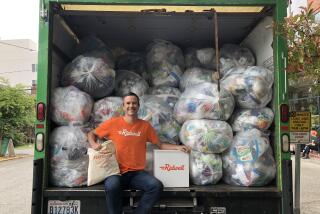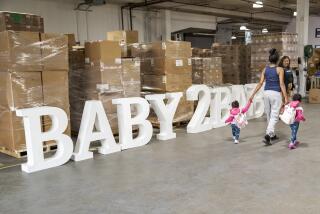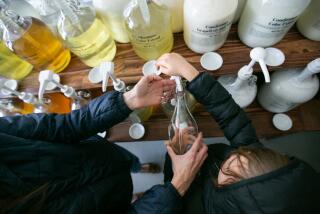Pair Happy With Bottom Line of...
- Share via
Terre Downey has a 3-year-old still in diapers. And that’s the way she likes it.
Her 3-year-old is a growing business known as Bare Bottoms Diaper Service, the largest diaper service in Ventura County. Terre and her husband, Tom, have turned the fledgling Camarillo-based operation from a start-up business with a few dozen customers and one small washing machine into a mature, money-making enterprise.
Bare Bottoms employs eight people who work on shifts nearly 24 hours a day to launder and deliver 60,000 diapers each week to 800 customers from Santa Barbara to Pasadena. The only other Ventura County diaper provider is a small Simi Valley firm, Lullaby Diaper Service.
“We’ve made it,” said Tom Downey, a man who brags that plastic diapers never touched his two children’s behinds. “Within three months after we started, we had more than 100 customers. It’s been almost astronomical from the start.”
The Downeys started Bare Bottoms after Terre, who was working nights with her husband in a janitorial business, saw a daytime TV talk show on the cloth-versus-plastic diaper debate.
“It was 1990 and it was Earth Day and we started thinking about the environmental impact of plastic diapers,” she said. “And we saw there really wasn’t anybody local providing diaper service.”
About the same time, Lullaby started up in Simi Valley. Although the business is much smaller and is now for sale, according to one of the partners, it also offers alternatives to disposables, including an all-in-one washable diaper and cover.
Since Procter & Gamble introduced the first disposable diapers in 1961, mothers weary of washing out cloth diapers in a toilet have chosen disposables by increasing numbers, a company spokeswoman said. By the 1970s, one out of two babies were diapered in disposables, and today the figure is nine out of 10.
But the use of cloth diapers is slowly becoming fashionable again, said Kathy Mautz, spokeswoman for the National Assn. of Diaper Services in Philadelphia.
“They’re making a comeback,” Mautz said. “Many have concerns about the landfill issues, and many new parents would rather have something natural against the baby’s skin instead of plastic.”
But the environmental argument is not so compelling because disposable diaper manufacturers have reduced the size of the product and its packaging, said Kelly Anchrum, spokeswoman for Procter & Gamble.
Disposable diapers make up less than 2% of the solid waste in the country, she said, and they use less water to manufacture than it takes to launder cloth diapers. Disposables are more convenient and do not need to be changed as often as cloth diapers, she said.
“But the real bottom line is they keep baby drier,” she said.
Allison Maires, a spokeswoman for the Ventura County Regional Sanitation District, said the choice is a personal one. Cardboard, packaging, yard and construction waste create more landfill problems than diapers, she said.
“The main thing is that mothers who opt for plastic should not feel guilty,” said Maires, who uses disposable diapers.
Terre Downey countered that plastic diapers still add unnecessary bulk to the country’s growing landfills. She said cloth is as convenient as self-closing disposables since cloth diaper covers now fasten with Velcro and do not require pins or plastic pants.
In addition, she said, older babies feel the damp diaper more easily with cloth diapers and are more eager to learn to use the bathroom.
“Cloth diapers are easier to potty train out of because the child knows when the diaper is wet,” she said.
Barbara Stephens, supervising registered nurse at the Community Memorial Hospital nursery in Ventura, said she would prefer cloth for the babies there.
“I raised my two sons with cloth,” she said. “It’s better than filling up the landfills.” But after trying cloth, the hospital has returned to disposable diapers for convenience, she said.
So the debate continues.
Diaper services are determined to make it easy for those who choose cloth diapers, their representatives say.
For about $50 per month, Bare Bottoms will deliver a stack of 40 to 50 fresh diapers twice a week and pick up a diaper pail full of soiled diapers. The cost does not include diaper covers, which can cost from $3 to $15 each and need to be replaced as the baby grows.
Lullaby offers 80 diapers a week for $46 per month. Customers can also rent diaper covers for an extra $2 per month each and Lullaby will wash the covers as well. The all-in-one diaper is new at Lullaby and no price has yet been established, a customer service representative said.
To buy an equivalent number of Pampers or other well-known brand of diapers for a month would cost about $60.
Customers need not rinse the diapers, no matter how soiled, before they are picked up, Downey said. New washing machines that can remove solid waste make home rinsing unnecessary, she said.
One recent day, Maria Elena Dios, herself a young mother, was at work at the Camarillo industrial building that houses Bare Bottoms and a host of other businesses. With delivery trucks in the driveway behind her and the large garage doors opened for ventilation, she stood over a pair of large laundry bins. Wearing plastic gloves, she separated the merely wet from the heavily soiled, ignoring the pungent odor surrounding her.
“It’s all the same to me,” she said. But her own baby at home uses Pampers, she said. It isn’t the smell or the inconvenience that makes her use disposable diapers, it’s just that “we’ve always used Pampers.”
After sorting, the diapers are loaded into two large-capacity washing machines equipped with computerized controls to add the correct amount of bleach and other chemicals at the correct time during the 13-step wash process.
The diapers then go into the dryers and out to the front counter where they are sorted by size, counted and stacked for delivery.
Terre Downey does the book work for Bare Bottoms and counsels new mothers-to-be over the telephone. Tom handles deliveries.
The service works out well for customers such as Millie Arnold of Ventura, who provides day care five days a week for four infants under 20 months old.
“I insist on cloth because I can’t see putting more disposable diapers into the landfill that just keeps growing and growing,” said Arnold, a mother of two grown children. “And I’m not for having all that between their legs as the disposables puff up.”
Alicia Carman chose cloth diapers because she received a coupon for one week of free diaper service when she delivered her daughter at Community Memorial Hospital in Ventura.
She said it’s true that cloth diapers have to be changed more often to keep her 8-month-old Alicia dry. But she figures her baby is more comfortable with cotton. And she finds the system convenient.
“I just throw them in the diaper pail,” she said.
More to Read
Inside the business of entertainment
The Wide Shot brings you news, analysis and insights on everything from streaming wars to production — and what it all means for the future.
You may occasionally receive promotional content from the Los Angeles Times.










